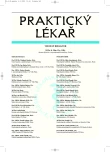-
Medical journals
- Career
Microvascular decompression of cranial nerves – effect and risk of treatment
Authors: V. Masopust; J. Plas; D. Netuka; V. Beneš
Authors‘ workplace: Přednosta: prof. MUDr. Vladimír Beneš, DrSc. ; Neurochirurgická klinika 1. LF UK, IPVZ a ÚVN, Praha
Published in: Prakt. Lék. 2009; 89(4): 209-211
Category: Therapy
Overview
Microvascular decompression (MVD) is nowadays a method of choice in diseases caused by neurovascular conflict. The goal of this article is to compare effectiveness and morbidity/mortality rate of MVD in trigeminal neuralgia group and the group of other neurovascular conflict related diseases. In all cases was neurovascular conflict visualised preoperatively on MRI scans. The results of MVD in medically intractable trigeminal neuralgia has shown high effectiveness and minimal morbidity. Other vascular compression related syndromes are also well responding to MVD procedure but with higher complication rate. There was no fatal case in both groups.
Key words:
microvascular decompression, neurovascular conflict, surgically treatment.
Sources
1. Akimura, T., Furutani, Y., Jimi, Y. et al. Essential hypertension and neurovascular compression at the ventrolateral medulla oblongata: MR evaluation. AJNR 1995, 16, p. 401-405.
2. Ciriello, J., Caverson, M.M., Polosa, C. Function of the ventrolateral medulla in the control of the circulation. Brain Res. 1986, 396, p. 359-391.
3. Colon, G.P., Quint, D.J., Dickinson, L.D. et al. Magnetic resonance evaluation of ventrolateral medullary compression in essential hypertension. J. Neurosurg. 1998, 88(2), p. 226-231.
4. Dampney, R.A., Goodchild, A.K., Robertson, L., Montgomery, W. Role of ventrolateral medulla in vasomotor regulation : a correlative anatomical and physiological study. Brain Res. 1982, 249, p. 223 - 235.
5. Dandy, W.E. The treatment of trigeminal neuralgia by the cerebellar rout. Ann. Surg. 1932, 96, p. 787-795.
6. Dandy, W.E. Concerning the cause of trigeminal neuralgia. Am. J. Surg. 1934, 24, p. 447-455.
7. Dandy, W.E. Trigeminal neuralgia and trigeminal tic douloureux. In : Lewis Practice of Surgery. Volume 12. Hagertstown:WF Prior Company; 1946. p. 167-168.
8. Gardner, W.J. The mechanism of tic douloureus. Trans. Am. Neurol. Assoc. 1953, 78, p. 168-173.
9. Gardner, W.J., Miklos, M.V. Response of trigeminal neuralgia to „decompression“ of sensory route. Discussion of cause of trigeminal neuralgia. JAMA 1959, 170, p. 1773-1776.
10. Gardner, W.J. Concerning mechanism of trigeminal neuralgia and hemifacial spasm. J. Neurosurg. 1962, 19, p. 947-957.
11. Jannetta, P.J. Neurovascular compression in cranial nerve and systemic disease. Ann. Surg. 1980, 192(4), p. 518-525.
12. Jannetta, P.J., Segal, R., Wolfson, S.K. Jr. Neurogenic hypertension: Etiology and surgical treatment. I : Observations in 53 patients. Ann. Surg. 1985, 201(3), p. 391-398.
13. Jannetta, P.J., Ricardo, S., Wolfson, S.K. Neurogenic hypertension: etiology and surgical treatment. Ann. Surg. 1985, 201(3), p. 391-398.
14. Kleineberg, B., Becker, H., Gaab, M.R. Neurovascular compression and essential hypertension, an angiographic study. Neuroradiology 1991, 33, p. 2-8.
15. Kleineberg, B., Becker, H., Gaab, M.R., Naraghi, R. Essential hypertension associated with neurovascular compression : angiographic findings. Neurosurgery 1992, 6, p. 834-841.
16. Masopust, V., Netuka, D., Plas, J., Beneš, V., Vrabec, M. Neurovaskulární konflikt – velikost zadní jámy lební. Česká a slovenská neurologie a neurochirurgie 2002, 65(3), s. 160-163.
17. Moller, A.R. The cranial nerve vascular compression syndrome: II. A review of pathophysiology. Acta Neurochir (Wien) 1991, p. 113 : 24–30
18. Moller, M.B., Moller, A.R., Jannetta, P.J. et al. Microvascular decompression of the eighth nerve in patients with disabling positional vertigo : selection criteria and operative results in 207 patients. Acta Neurochir. 1993, 125(1-4), p. 75-82.
19. Naraghi, R., Gaab, M.R., Valter, G.F., Kleineberg, B. Arterial hypertension and neurovascular compression at the ventrolateral medulla. A comparative microanatomical and pathological study. J. Neurosurg. 1992, 77(1), p. 103-112.
20. Polo, G., Fischer, C., Sindou, M.P., Marneffe, V. Brainstem auditory evoked potential monitoring dutiny microvascular decompression for hamifacial spasm: intraoperative brainstem auditory evoked potential changes and warning values to prezent hearing loss-prospective study in a consecutive series of 84 patients. Neurosurgery 2004, 54(1), p. 97-104.
21. Rhee, D.J., Kong, D.S., Park, K., Lee. J.A. Frequency and prognosis of delayed facial palsy after microvascular decompression for hemifacial spasm. Acta Neurochir. (Wien) 2006, 148(8), p. 839-843.
22. Ross, C.A., Ruggiero, D.A., Park, D.H. et al. Tonic vasomotor control by the rostral ventrolateral medulla: effect of electrical or chemical stimulation of the area containing C1 adrenaline neurons on arterial pressure, heart rate, and plasma catecholamines and vasopressin. J. Neurosci. 1984, 4, p. 474-494.
23. Samson, J.H., Grossi, P.M., Asaoka, K., Fukushima, T. Microvascular decompression for glossopharyngeal neuralgia : long-term effectiveness and complication avoidance. Neurosurgery 2004, 54(4), p. 884-889.
24. Thei Van, H., Deguine, O., Estere-Fraysse, M.J. et al. Cochleovestibular disorders associated with hemifacial spasm: an outcome after microvascular decompression of the facial nerve. Ann. Otolaryngol. Chir. Cervicofac. 1998, 115 (1), p. 9-18.
Labels
General practitioner for children and adolescents General practitioner for adults
Article was published inGeneral Practitioner

2009 Issue 4-
All articles in this issue
- Actinic prurigo
- Anterior chest wall reconstruction using transverse plate fixation system in complicated sternotomy wound
- Detection of latent tuberculosis, QuantiFERON-TB Gold test, possibilities and pitfalls of the method
- Microvascular decompression of cranial nerves – effect and risk of treatment
- Current overview of the diagnosis and treatment of cancer of the stomach
- Lichen sclerosus
- Neuronal basis of personality and intelligence.
- Short-term follow-up after open-heart surgery in the elderly
- General Practitioner
- Journal archive
- Current issue
- Online only
- About the journal
Most read in this issue- Lichen sclerosus
- Detection of latent tuberculosis, QuantiFERON-TB Gold test, possibilities and pitfalls of the method
- Microvascular decompression of cranial nerves – effect and risk of treatment
- Current overview of the diagnosis and treatment of cancer of the stomach
Login#ADS_BOTTOM_SCRIPTS#Forgotten passwordEnter the email address that you registered with. We will send you instructions on how to set a new password.
- Career

